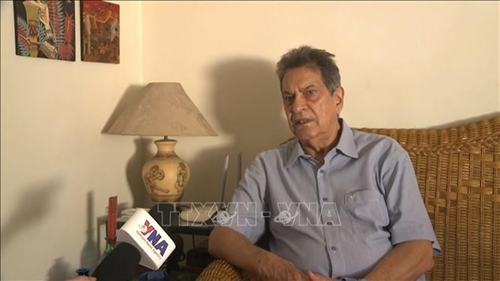The revolution was one of the many epics created by the Vietnamese people, and it fundamentally changed the situation in Vietnam, in French Indochina at the time, as well as having a significant impact on colonial regimes around the world, the official told the Vietnam News Agency’s correspondent in Havana on the occasion of the 80th anniversary of the August Revolution (August 19) and National Day (September 2, 1945 - 2025).
    |
 |
|
Fredesmán Turró González, former Cuban Ambassador to Vietnam and Vice President of the Cuba - Vietnam Friendship Association, talks to VNA correspondents in Havana |
According to him, the August Revolution, also known as the August Uprising, demonstrated the boldness of the Indochinese Communist Party at that time, now the Communist Party of Vietnam, along with late President Ho Chi Minh and other leaders. The Party's National Congress, held in Tan Trao from August 14 to 15, 1945, concluded that all objective and subjective conditions were ripe to launch a general uprising to seize power from the Japanese fascists before the allied forces entered Indochina.
The Vice President of the Cuba-Vietnam Friendship Association emphasized that the revolution also highlighted the importance of unity within the Party and among the leadership, as well as the necessity of continuously studying and analyzing both objective and subjective conditions in order to determine the appropriate course of action at each historical moment. In this sense, the August Revolution left behind an extremely valuable lesson.
The victory led to the birth of the Democratic Republic of Vietnam (now the Socialist Republic of Vietnam) 80 years ago. For the first time, the Vietnamese people lived in an independent, sovereign nation and enjoyed full rights. It was also the first time that a democratic and people's republic emerged in Southeast Asia.
However, the Vietnamese people had to continue their struggle, not to gain independence and sovereignty, but to defend the country against foreign aggressors.
González assessed that over the past 80 years of building, defending, and developing the country, Vietnam has achieved significant victories in all fields. It has defeated every enemy that threatened its independence and sovereignty, culminating in the historic victory of April 30, 1975, which reunified the country after years of war.
The official expressed deep admiration for Vietnam's socio-economic achievements, especially following the 6th National Party Congress.
He noted that by avoiding dogmatism and adapting to the country’s realities, Vietnam underwent significant ideological and structural transformations which not only helped it overcome severe difficulties in the mid-1980s but also led to remarkable socio-economic breakthroughs.
Vietnam’s economy is now considered one of the most dynamic in the world, with consistently high annual growth rates. In the first half of this year, its GDP grew by 7.52%, paving the way for an annual growth rate of over 8% set for this year and in the coming years.
González held that Vietnam's economic achievements and dynamic growth, its active integration into the global economy, diplomacy of peace, and partnerships, as well as its increasing participation in international forums and events have significantly enhanced the country’s international reputation, making it an important player in global politics.
He also regarded the leadership of the Communist Party of Vietnam as the key to all of the Vietnamese people's successes, both in defending the nation and in driving economic development.
Source: VNA